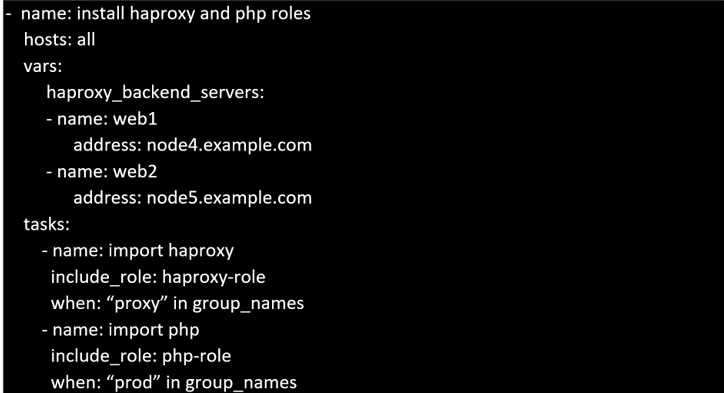Quiz
User bob has been created on your control node. Give him the appropriate permissions on the
control node. Install the necessary packages to run ansible on the control node.
Create a configuration file /home/bob/ansible/ansible.cfg to meet the following requirements:
• The roles path should include /home/bob/ansible/roles, as well as any other path that may be
required for the course of the sample exam.
• The inventory file path is /home/bob/ansible/inventory.
• Ansible should be able to manage 10 hosts at a single time.
• Ansible should connect to all managed nodes using the bob user.
Create an inventory file for the following five nodes:
nodel.example.com
node2.example.com
node3.example.com
node4.example.com
node5.example.com
Configure these nodes to be in an inventory file where node1 is a member of group dev. nodc2 is a
member of group test, nodc3 is a member of group proxy, nodc4 and node 5 are members of group
prod. Also, prod is a member of group webservers.
[defaults]
inventory=/home/sandy/ansible/inventory
roles_path=/home/sandy/ansible/roles
remote_user= sandy
host_key_checking=false
[privilegeescalation]
become=true
become_user=root
become_method=sudo
become_ask_pass=false
In /home/sandy/ansible/inventory
[dev]
node 1 .example.com
[test]
node2.example.com
[proxy]
node3 .example.com
[prod]
node4.example.com
node5 .example.com
[webservers:children]
prod
Quiz
new repository. The name of the repo will be 'EPEL' the description 'RHEL8' the baseurl is
'https://dl.fedoraproject.org/pub/epel/epel-release-latest-8.noarch.rmp' there is no gpgcheck, but
you should enable the repo.
* You should be able to use an bash script using adhoc commands to enable repos. Depending on
your lab setup, you may need to make this repo "state=absent" after you pass this task.
vim adhoc.sh
#I/bin/bash
ansible all -m yum_repository -a 'name=EPEL description=RHEL8
baseurl=https://dl.fedoraproject.org/pub/epel/epel-release-latest-8.noarch.rmp
gpgcheck=no enabled=yes'
Quiz
hosts. On dev, prod and webservers install packages httpd, mod_ssl, and mariadb. On dev only install
the development tools package. Also, on dev host update all the packages to the latest.
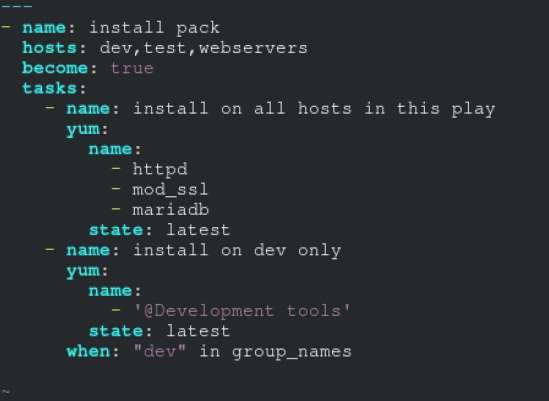
** NOTE 1 a more acceptable answer is likely 'present' since it's not asking to install the latest
state: present
** NOTE 2 need to update the development node
- name: update all packages on development node
yum:
name: '*'
state: latest
Quiz
enables and starts the firewall and allows the webserver service. Create a template called
index.html.j2 which creates and serves a message from /var/www/html/index.html Whenever the
content of the file changes, restart the webserver service.
Welcome to [FQDN] on [IP]
Replace the FQDN with the fully qualified domain name and IP with the ip address of the node using
ansible facts. Lastly, create a playbook in /home/sandy/ansible/ called apache.yml and use the role
to serve the index file on webserver hosts.
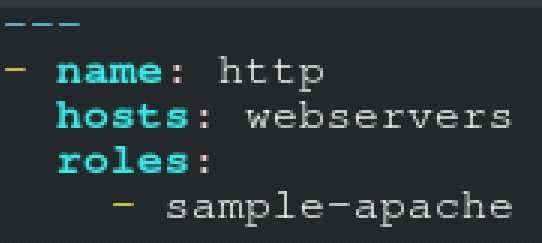
/home/sandy/ansible/roles/sample-apache/tasks/main.yml
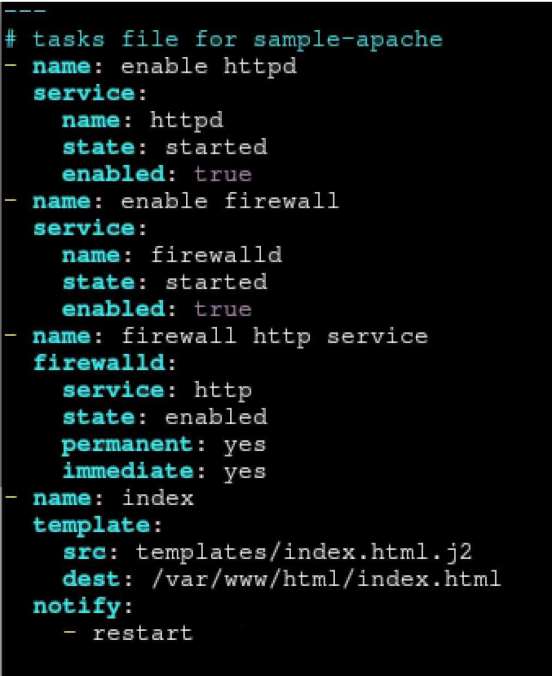
/home/sandy/ansible/roles/sample-apache/templates/index.html.j2

In /home/sandy/ansible/roles/sample-apache/handlers/main.yml

Quiz
for the first role is geerlingguy.haproxy and geerlingguy.php. Name the first haproxy-role and the
second php-role. The roles should be installed in /home/sandy/ansible/roles.
vim requirements.yml

Run the requirements file from the roles directory:
ansible-galaxy install -r requirements.yml -p /home/sandy/ansible/roles
Quiz
/home/sandy/ansible/. The haproxy-role should be used on the proxy host. And when you curl
http://node3.example.com it should display "Welcome to node4.example.com" and when you curl
again "Welcome to node5.example.com" The php-role should be used on the prod host.
Quiz
/home/sandy/ansible directory. In the lock.yml file define two variables. One is pw_dev and the
password is 'dev' and the other is pw_mgr and the password is 'mgr' Create a regular file called
secret.txt which contains the password for lock.yml.
New Vault Password: reallysafepw
Confirm: reallysafepw

Quiz
at /home/sandy/ansible. The passwords for these users should be set using the lock.yml file from
TASK7. When running the playbook, the lock.yml file should be unlocked with secret.txt file from
TASK 7.
All users with the job of 'developer' should be created on the dev hosts, add them to the group
devops, their password should be set using the pw_dev variable. Likewise create users with the job
of 'manager' on the proxy host and add the users to the group 'managers', their password should be
set using the pw_mgr variable.
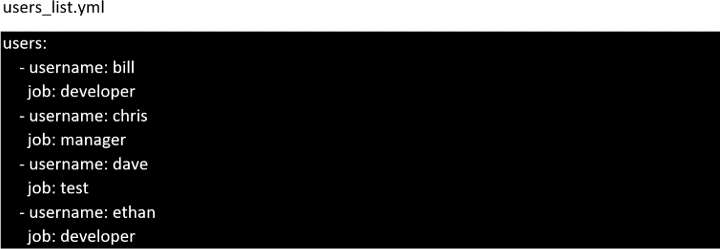
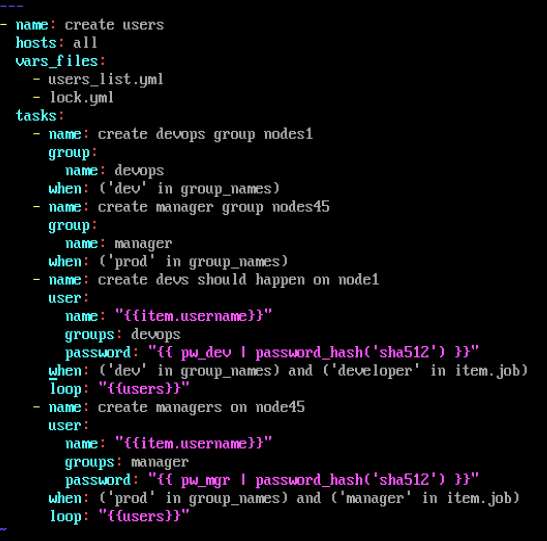
Quiz
HOST=
MEMORY=
BIOS=
VDA_DISK_SIZE=
VDB_DISK_SIZE=
Create the playbook /home/bob/ansible/specs.yml which copies specs.empty to all remote nodes'
path /root/specs.txt. Using the specs.yml playbook then edit specs.txt on the remote machines to
reflect the appropriate ansible facts.
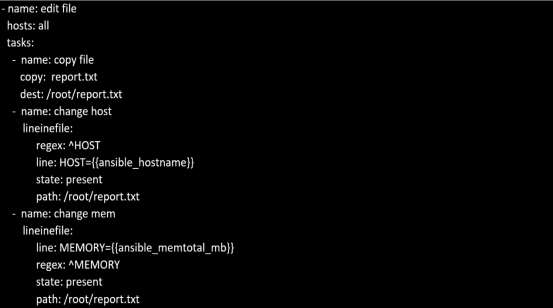
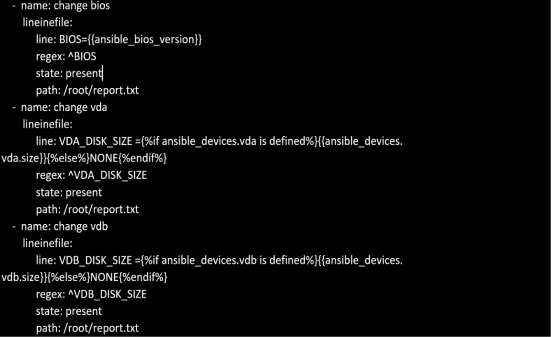
Quiz
one below. The order of the nodes doesn't matter. Then create a playbook in /home/sandy/ansible
called hosts.yml and install the template on dev node at /root/myhosts
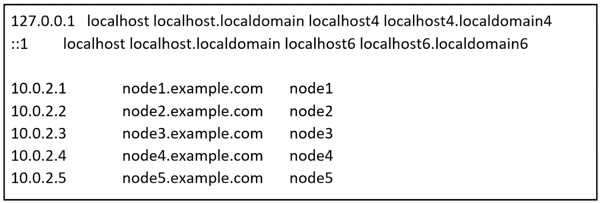
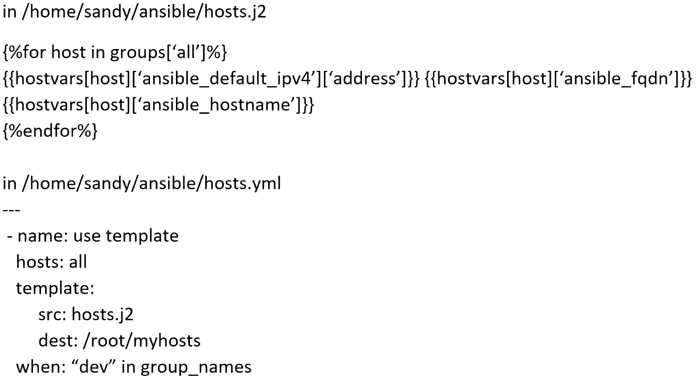
RedHat Red Hat Certified Specialist in Advanced Automation: Ansible Best Practices Practice test unlocks all online simulator questions
Thank you for choosing the free version of the RedHat Red Hat Certified Specialist in Advanced Automation: Ansible Best Practices practice test! Further deepen your knowledge on RedHat Simulator; by unlocking the full version of our RedHat Red Hat Certified Specialist in Advanced Automation: Ansible Best Practices Simulator you will be able to take tests with over 26 constantly updated questions and easily pass your exam. 98% of people pass the exam in the first attempt after preparing with our 26 questions.
BUY NOWWhat to expect from our RedHat Red Hat Certified Specialist in Advanced Automation: Ansible Best Practices practice tests and how to prepare for any exam?
The RedHat Red Hat Certified Specialist in Advanced Automation: Ansible Best Practices Simulator Practice Tests are part of the RedHat Database and are the best way to prepare for any RedHat Red Hat Certified Specialist in Advanced Automation: Ansible Best Practices exam. The RedHat Red Hat Certified Specialist in Advanced Automation: Ansible Best Practices practice tests consist of 26 questions and are written by experts to help you and prepare you to pass the exam on the first attempt. The RedHat Red Hat Certified Specialist in Advanced Automation: Ansible Best Practices database includes questions from previous and other exams, which means you will be able to practice simulating past and future questions. Preparation with RedHat Red Hat Certified Specialist in Advanced Automation: Ansible Best Practices Simulator will also give you an idea of the time it will take to complete each section of the RedHat Red Hat Certified Specialist in Advanced Automation: Ansible Best Practices practice test . It is important to note that the RedHat Red Hat Certified Specialist in Advanced Automation: Ansible Best Practices Simulator does not replace the classic RedHat Red Hat Certified Specialist in Advanced Automation: Ansible Best Practices study guides; however, the Simulator provides valuable insights into what to expect and how much work needs to be done to prepare for the RedHat Red Hat Certified Specialist in Advanced Automation: Ansible Best Practices exam.
BUY NOWRedHat Red Hat Certified Specialist in Advanced Automation: Ansible Best Practices Practice test therefore represents an excellent tool to prepare for the actual exam together with our RedHat practice test . Our RedHat Red Hat Certified Specialist in Advanced Automation: Ansible Best Practices Simulator will help you assess your level of preparation and understand your strengths and weaknesses. Below you can read all the quizzes you will find in our RedHat Red Hat Certified Specialist in Advanced Automation: Ansible Best Practices Simulator and how our unique RedHat Red Hat Certified Specialist in Advanced Automation: Ansible Best Practices Database made up of real questions:
Info quiz:
- Quiz name:RedHat Red Hat Certified Specialist in Advanced Automation: Ansible Best Practices
- Total number of questions:26
- Number of questions for the test:50
- Pass score:80%
You can prepare for the RedHat Red Hat Certified Specialist in Advanced Automation: Ansible Best Practices exams with our mobile app. It is very easy to use and even works offline in case of network failure, with all the functions you need to study and practice with our RedHat Red Hat Certified Specialist in Advanced Automation: Ansible Best Practices Simulator.
Use our Mobile App, available for both Android and iOS devices, with our RedHat Red Hat Certified Specialist in Advanced Automation: Ansible Best Practices Simulator . You can use it anywhere and always remember that our mobile app is free and available on all stores.
Our Mobile App contains all RedHat Red Hat Certified Specialist in Advanced Automation: Ansible Best Practices practice tests which consist of 26 questions and also provide study material to pass the final RedHat Red Hat Certified Specialist in Advanced Automation: Ansible Best Practices exam with guaranteed success. Our RedHat Red Hat Certified Specialist in Advanced Automation: Ansible Best Practices database contain hundreds of questions and RedHat Tests related to RedHat Red Hat Certified Specialist in Advanced Automation: Ansible Best Practices Exam. This way you can practice anywhere you want, even offline without the internet.
BUY NOW